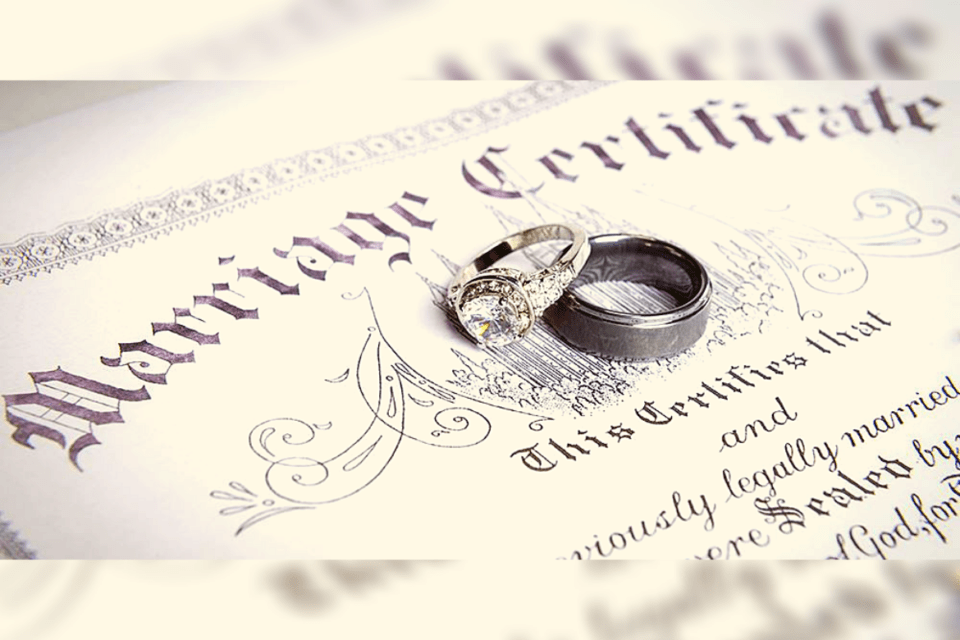JEFFERSON CITY, Mo. (March 15, 2021) Last week, a Missouri House committee passed a bill that would end government marriage licenses in the state, an important step towards nullifying both major sides of the contentious national debate over government-sanctioned marriage.
Rep. Adam Schnelting (R-St. Charles) introduced House Bill 1282 (HB1282) on Feb. 23. The legislation would amend the state’s marriage laws by replacing marriage licenses with “contracts of domestic union.”
“Two persons seeking to be married in this state and who are otherwise legally authorized to do so shall enter into a contract of domestic union. A contract of domestic union shall be the legal equivalent of marriage under the laws of this state.”
In practice, the state’s role in marriage would be almost entirely limited to recording marriage contracts entered into by consenting adults, or with parental consent if under the age of 18.
A civil and independent or religious ceremony of marriage, celebration of marriage, solemnization of marriage, or any other officiation, and administration of the vows of marriage may be conducted or engaged in by the parties to this contract of domestic union by an officiant or other presiding party to be selected by the parties to the contract. The state shall have no requirement for such ceremonial proceeding that, whether performed, shall have no legal effect upon the validity of the contract of domestic union.
The contract of domestic union shall be recorded by the recorder of deeds and shall constitute a legal record of a domestic union of the two parties.
The proposed law would change all references to unmarried persons in state law to “persons not party to a contract of domestic union” and swap all mentions of “marriage” with “contracts of domestic union.” Further, it would repeal a section of state law that specifically defines marriage as a union between a man and a woman, and that prohibits same-sex couples from receiving marriage licenses.
HB1282 would still retain certain restrictions on contracts of domestic union such as prohibiting those under the age of 15 from entering into them, as well as a continued prohibition on incest and bigamy. Common law marriages would also remain illegal.
On March 10, the House Downsizing State Government Committee passed HB1282 by a 7-5 vote.
Alabama enacted a similar law last year.
Testifying for a similar bill last year, Schnelting, an ordained minister, said it’s about getting the government out of marriage.
“Whether you’re religious, whether you’re nonreligious, whether you’re straight, whether you’re a member of the LGBT community, this is about restoring the government to its proper role. If I don’t need a license for my right to keep and bear arms, I certainly do not need the government’s permission or a license to marry.”
There is significant opposition to the bill, both from supporters of “traditional marriage” and advocates for same-sex unions.
While this change in the law may seem like semantics, it is quite significant. It ends the requirement to get state permission before getting married. The state would instead simply record signed contracts between consenting individuals. In effect, it would remove the state from the approval process and relegate it to a mere record-keeper.
Passage of HB1282 would take a step toward returning to the traditional Western custom in which the state had little to no involvement in marriage, even though it was a legal contract as well as a religious institution. Marriage in medieval Europe technically fell under the legal jurisdiction of the Catholic Church, with priests officiating weddings at the door of the community church. However, it was ultimately a private arrangement that did not require a third party in order to be considered legitimate.
In “The Middle Ages: Everyday Life in Medieval Europe,” Jeffrey Singman writes that proposed marriages were announced at the parish church of both persons for three Sundays, but this was in order to ensure problems such as preexisting marriage agreements did not arise. Still, “not every marriage followed these formalities.”
Singman writes:
According to canon law, marriage could be contracted either by a vow of marriage expressed in the present tense or by a statement of future intent to marriage followed by sexual consummation. The latter sort of marriage in particular could take place without the participation of church or community. Such marriages were illegal, but not invalid; the although the couple might be prosecuted in the church courts, they remained legally married.
In fact, state marriage licenses were initially used to prevent interracial marriages. As a 2007 New York Times op/ed points out, licenses later became necessary in order to subsidize the welfare state.
“The Social Security Act provided survivors’ benefits with proof of marriage. Employers used marital status to determine whether they would provide health insurance or pension benefits to employees’ dependents. Courts and hospitals required a marriage license before granting couples the privilege of inheriting from each other or receiving medical information.”
In a modern political context, HB1282 would reduce the state’s role in defining and regulating marriage, which has become a contentious issue and places a burden on government officials torn between the legal requirements of their jobs and their personal religious convictions. By limiting the state’s role in marriage, the legislation will allow Missourians to structure their personal relationships as they see fit without interference or approval from the government.
Something rarely considered by those seeking to control the state’s definition of marriage is that a marriage license means a person requires government permission before getting married. In America, people generally cannot drive a vehicle without a license. People cannot practice law without a license, nor can they provide medical care. Put another way, under a licensing scheme, marriage is not a right, nor a religious institution, but a privilege granted by the state and limited by its requirements.
Consider this: In the same way a driver can lose their license if they break certain traffic laws, a man or woman, theoretically, could one day find their marriage license revoked for breaking certain “marriage” rules, whether it pertains to childrearing or their religious and political convictions.
Christopher Wesley, an associated scholar at the Mises Institute, wrote that “marriage is most endangered when it rests in the coercive hands of the State.”
Constitutionally, marriage is an issue left to the state and the people.
Removing state meddling in marriage will render void the edicts of federal judges that have overturned state laws defining the institution. The founding generation never envisioned unelected judges issuing ex-cathedra pronouncements regarding the definition of social institutions, and the Constitution delegates the federal judiciary no authority to do so.
WHAT’S NEXT
HB1282 will now move to the House Rules Administrative Oversight Committee where it must pass by a majority vote before moving forward in the legislative process.





1 comment
… [Trackback]
[…] Read More to that Topic: thelibertarianrepublic.com/missouri-bill-to-eliminate-marriage-licensing/ […]